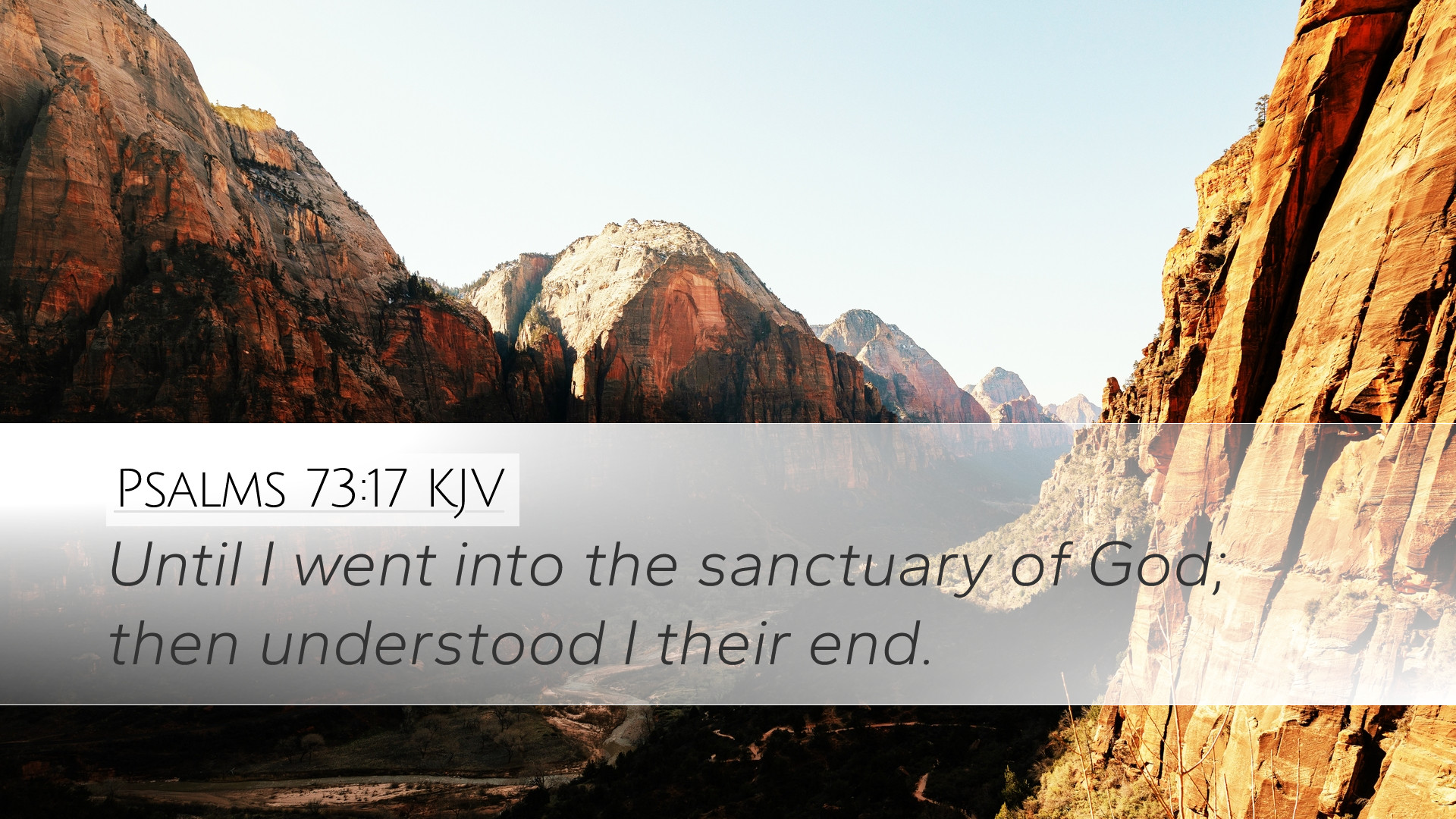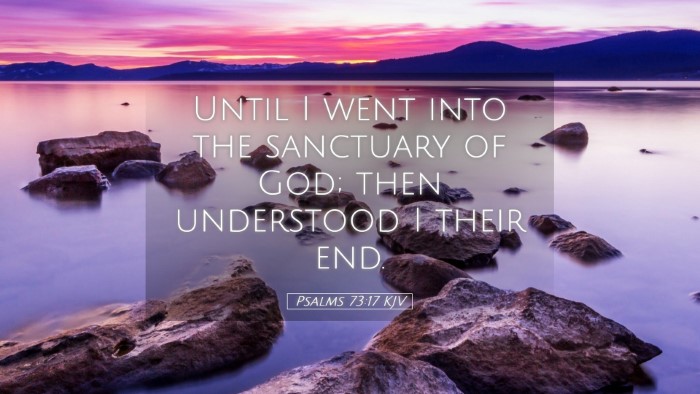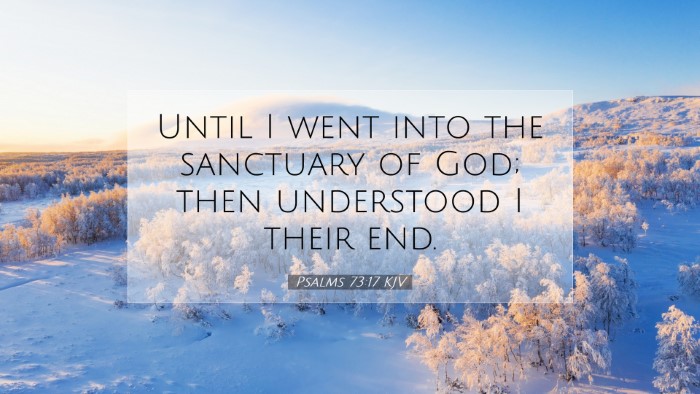Psalms 73:17 Commentary
Psalms 73:17 states: "Until I went into the sanctuary of God; then understood I their end." This verse represents a pivotal moment in the psalmist's experience and perception of the wicked and their apparent prosperity. Below is a detailed commentary drawing on insights from public domain sources, illuminating the depth of this powerful Scripture.
Context and Background
The Psalm 73 is attributed to Asaph, a chief musician and a figure often associated with the Levitical worship. This particular psalm reflects the struggle of faith amidst visual inequities and moral dilemmas. It opens with a declaration of God’s goodness toward Israel and a personal lament about the apparent prosperity of the wicked. The turning point, expressed in verse 17, occurs when the psalmist enters the sanctuary of God, which symbolizes a place of divine presence and revelation.
Insufficient Understanding of Prosperity
Initially, Asaph is perplexed by the success of the wicked. Matthew Henry highlights that the apparent ease of their lives leads to spiritual confusion and jealousy among the faithful. Henry remarks:
“He looks upon their prosperity, and cannot understand why they should have so much of the comforts of life, while the righteous seem to suffer.”
This confusion is common among believers who observe social injustice and misapply their theology to life circumstances. The author’s honesty in expressing doubt gives voice to the struggles faced by many.
The Turning Point: Entrance into the Sanctuary
Verse 17 marks a significant shift in perspective: “Until I went into the sanctuary of God.” Albert Barnes elucidates this notion, explaining that the sanctuary represents a place of divine counsel and worship, where one can gain insights unavailable to the human eye:
“In the sanctuary, he gained a clearer understanding of life, death, and the ultimate justice of God.”
Adam Clarke adds that the sanctuary is a place of communion with God, emphasizing the importance of sacred spaces in facilitating spiritual awakening and clarity. By entering into worship, the psalmist finds understanding and divine perspective away from earthly distractions.
Understanding Their End
The revelation that follows the psalmist's entry into the sanctuary is crucial: “then understood I their end.” This phrase is laden with theological implications regarding judgment and eternal destiny. The contrast between the immediate success of the wicked and their ultimate fate is underscored here.
- The Reality of Judgment: As Barnes notes, the truth of God’s justice becomes clear upon reflection in the sanctuary. The apparent prosperity of the wicked is temporary, and their end is destined for destruction.
- Eternal Perspective: Henry emphasizes the importance of having an eternal perspective. The psalmist's view broadens beyond earthly life to eternity—reminding believers that God’s justice may not always be visible in the present.
- Divine Wisdom: Clarke points out the error of judging God’s favor based solely on worldly circumstances, encouraging believers to trust that God’s wisdom ultimately prevails in the grand tapestry of life.
The Role of Worship and Community
In this passage, the function of communal worship becomes evident. Entering the sanctuary is not just an individual act but reflects the significance of community in understanding and experiencing God’s truths.
- Shared Experience: Asaph's journey reminds congregations of the importance of gathering to reflect on God’s character and faithfulness.
- Mutual Edification: In the context of worship, believers can support each other through doubts, reminding one another of God’s ultimate plans and justice.
- Teachability: This narrative invites pastors and leaders to create environments in which seekers can enter with questions and leave with understanding.
Application for Today’s Believers
The insights derived from Psalms 73:17 resonate with modern believers who face similar challenges regarding faith and perception. The psalmist’s realization serves as a template for navigating doubts:
- Encouragement in Doubt: The honest portrayal of doubt in the psalms provides assurance that questioning is a part of faith, allowing believers to safely explore their struggles with God.
- Seeking God’s Presence: Just as Asaph found clarity in the sanctuary, today's believers are encouraged to pursue encounters with God in prayer, worship, and Scripture study—areas where understanding can be deepened.
- Focus on Eternity: Believers are prompted to cultivate an eternal perspective, guarding their hearts against comparing themselves inadequately to others based on earthly metrics of success.
Conclusion
Psalms 73:17 invites profound reflection on the nature of God’s justice and the reality of human experience. The transition from confusion to clarity exemplifies the transformative power of entering into the presence of God. This ancient wisdom, drawn from the insights of Henry, Barnes, and Clarke, remains relevant for pastors, students, theologians, and scholars today, encouraging a deeper understanding of life’s complexities through the lens of divine truth.


